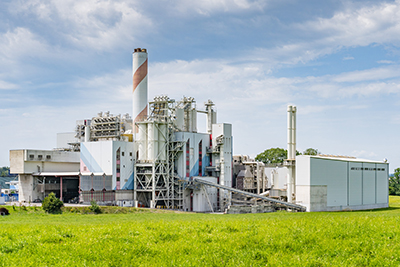UK’s industrial heartlands could be “the beating heart” of economic growth and new jobs from carbon capture, usage and storage

The North East, North West and South East of England could be the hot beds of economic growth and job creation from the emerging carbon capture, usage and storage (CCUS) industry. North Eastern and Eastern Scotland may also have an opportunity to translate their existing capabilities in oil and gas into CCUS expertise.
That’s according to a new report jointly from the Grantham Research Institute on Climate Change and the Environment, and the Centre for Economic Performance – which are both part of the London School of Economics and Political Science (LSE).
The authors, who analysed patterns in patenting in order to reach their findings, suggest that these regions could be good locations for research and development hubs, to boost the potential for growth and jobs from innovation in the industry, and contribute to levelling-up across the UK.
The analysis, published today, Wednesday 22 September, in the “Seizing Sustainable Growth Opportunities from Carbon Capture, Usage and Storage in the UK” report, also emphasised that industry is ready to bring CCUS technology off the ground, but needs the UK Government to back its published plans with a detailed, long-term framework, in order to spur investment.
Existing research shows that CCUS can preserve up to 53,000 jobs in energy-intensive industries and create up to 31,000 jobs primarily from construction activities by 2030. The Climate Change Committee said that CCUS is “a necessity, not an option” for the UK to reach net-zero by 2050.
Esin Serin, lead author on the report, and policy analyst at the Grantham Research Institute for Climate Change and the Environment at LSE, said:
“It’s clear that CCUS is a critical piece of the puzzle – alongside renewable and other low-carbon solutions – to enable us to reach net-zero.
“Our new analysis of patents found innovation hot spots in industrial areas in the North East and North West as well as the South East of England. There may also be opportunities for North Eastern and Eastern Scotland which have innovation credentials in oil and gas, but not yet in CCUS, as we move towards a lower carbon economy. The regional opportunities we identify point to the significant role of CCUS for levelling up across the country.
“We found that the UK’s industrial heartlands could be the beating heart of economic growth and new jobs from the carbon capture, usage and storage industry.”
Anna Valero, a co-author on the report, and an ESRC Innovation Fellow at the LSE’s Centre for Economic Performance, said:
“An inconsistent policy environment, including two failed major demonstration competitions, has been the primary setback against CCUS development in the UK to date. Now is the time to make up for years of stalled progress in deploying this essential technology. What’s more: fast, strategic action can unlock growth opportunities along the way.”
The report also found that six in ten (60%) of CCUS patents co-occur with innovation in physical or chemical separation processes – suggesting there is potential to diversify into CCUS for a yet wider pool of companies.
The authors say that even though some of the UK’s peers like Germany and the United States seem to have a current advantage in CCUS-related exports, there are still good opportunities for the UK as no single country has yet established dominance over the market.
The analysis also found that a significant number of CCUS-related products that the UK already exports competitively are in the measuring, monitoring and verification (MMV) instrument category which will be required to monetise carbon dioxide as part of any commercial framework for CCUS.
The report’s authors recommend that a consistent, long-term policy, institutional and regulatory framework – underpinned by multi-year funding – is needed to improve coordination across stakeholders. This should happen at national and local levels on the entire portfolio of net-zero solutions and technologies, including CCUS.
The authors also recommend that the UK Government should make up for years of stalled progress by taking a holistic approach, addressing barriers to CCUS investment. They should capitalise on the UK’s comparative advantages across the five types of capital needed for sustainable and inclusive growth: infrastructure or physical capital; knowledge capital and innovation; human; natural; and social capital.
CCUS is a collection of technologies which allow the permanent storage of carbon dioxide, capturing it either directly from the air, or from major emitters including power generation or industrial facilities. Growing evidence suggests that stabilising global temperatures will require large-scale removal of carbon dioxide from the air for us to achieve net-zero by mid-century.
The authors on this report are Esin Serin, Anna Valero, Ralf Martin, Arjun Shah, Pia Andres and Penny Mealy. The report builds on a portfolio of previous reports focusing on the economy-wide case for sustainable growth written for the LSE Growth Commission.
To see the full report, or interviews with the authors, please contact Anna Ford on a.ford1@lse.ac.uk or Bob Ward on +44 (0)7811 320346 or r.e.ward@lse.ac.uk.
Notes to Editors:
The Grantham Research Institute on Climate Change and the Environment was established in 2008 at the London School of Economics and Political Science. The Institute brings together international expertise on economics, as well as finance, geography, the environment, international development and political economy to establish a world-leading centre for policy-relevant research, teaching and training in climate change and the environment. It is funded by the Grantham Foundation for the Protection of the Environment, which also funds the Grantham Institute – Climate Change and the Environment at Imperial College London. www.lse.ac.uk/grantham/
The Centre for Economic Performance (CEP) is an independent research centre based at the London School of Economics and Political Science. Its members are from the LSE and a wide range of universities within the UK and around the world. www.cep.lse.ac.uk . The Centre for Economic Performance is part-funded by the Economic and Social Research Council, part of UK Research and Innovation (UKRI) https://esrc.ukri.org/ https://www.ukri.org/

